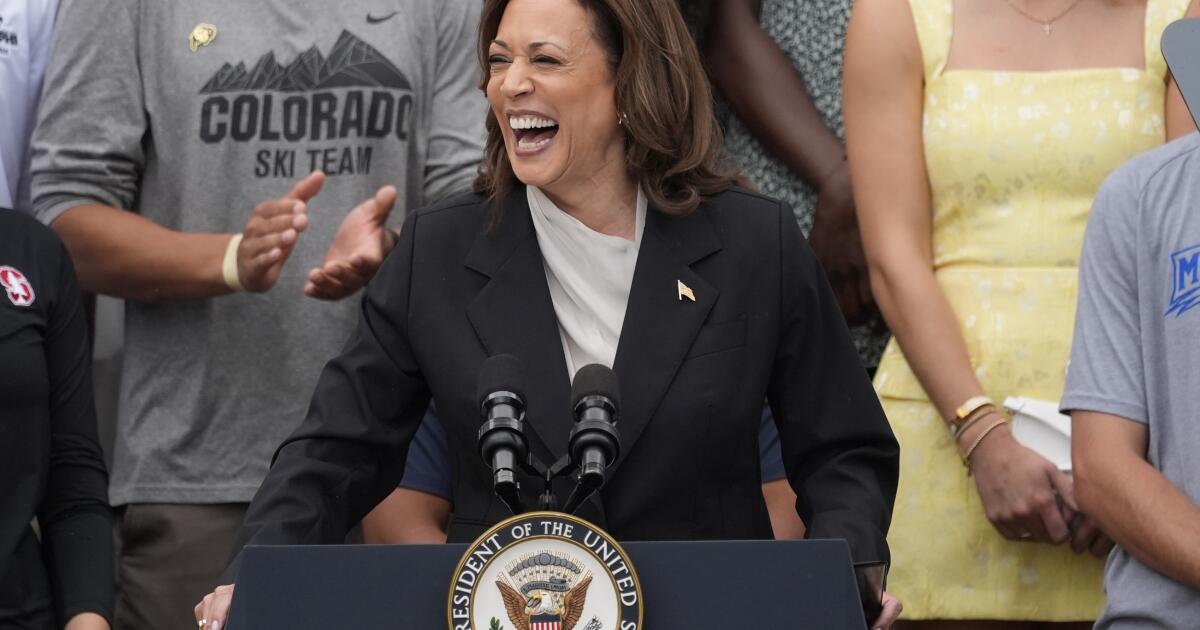In her 2019 memoir, “The Truths We Hold,” Kamala Harris wrote: “Words are incredibly powerful, and people in power, whose words can carry furthest and fastest, have an obligation, a duty, to speak them with precision and wisdom.”
She’s right. Harris has less than four months to win Americans’ trust and get them used to a wholly unfamiliar idea: a Black woman occupying the country’s highest political position. And the strongest tool in her arsenal is her words.
Coverage of Harris throughout her vice presidency has repeatedly ridiculed her speech. Rival presidential candidate Donald Trump often mocks her speaking style. Right-wing pundits refer to her remarks as “word salad.” In the instance of the viral “coconut tree” line, her detractors called her language “bizarre” and “mystifying,” even as the quote inspired a flurry of memes.
In the face of all this, some may say that Harris needs to work on her words — to use them to show herself as a powerful and capable leader, not just a punch line.
They would be wrong.
American society closely scrutinizes leaders, particularly women of color, and places each somewhere on a continuum between “dominance” and “warmth.” Some leaders choose to emphasize dominance — they cross their arms, reference power and competition and rarely smile. Harris’ choice to aim for warmth — her quick laugh, seemingly easy grin and her references to wellness and her family in what has been called a “self-help” style — is a brilliant strategy that can win her the presidency. This warmth helps her avoid the backlash that women, and women of color in particular, inevitably face for showing power.
Female leaders must walk a fine line between hard-hitting leadership and pleasant amiableness. Don’t be emotional, but don’t be cold. Take charge, but don’t be bossy. This impossible balancing act (brilliantly described in that famous “Barbie” monologue) is an impossible test that many female leaders, including Hillary Clinton, fail. As a woman of color, Harris faces an even higher bar. And she likely knows it.
In a recently published study, I asked dozens of Black female managers to tell me about their approach to leadership. I first asked each to imagine she was the first and only Black woman in a high-profile leadership role. I then asked them to describe if they would seek to show their dominance or their warmth in the leadership style they would adopt. And how did they think others would react to it?
These managers said they would be more likely to adopt a warm leadership style — and they expected more punishment, including backlash, for dominant leadership. White women said the opposite. They said they’d be less likely to adopt a warm leadership style and more likely to expect punishment for warm leadership.
Michelle Obama, one of the most well-known Black women in the world, alluded to the backlash that Black women may face for dominance. During her 2018 book tour, she referenced Sheryl Sandberg’s famous “lean in” mantra, quipping, “that s— doesn’t work all the time” — a comment for which she received (you guessed it) backlash.
Are Black women leaders right to expect punishment for showing dominance? To find out, I collected 250,000 remarks made by hundreds of Black and white members of Congress, including Harris, Elizabeth Warren, Beto O’Rourke and Barack Obama. I then collected 18,000 editorials written about these same politicians during their congressional tenures. The more often Black congresswomen used dominant language on the House or Senate floor — words such as “assertive,” “competitive” and “strong” — the more often journalists wrote about them using cold language — words such as “rude” and “unlikable.” There was no such backlash for white congresswomen, Black congressmen or white congressmen.
It’s not only journalists who penalize Black female leaders who use dominant language — voters do too. I asked more than 800 American voters to review the social media profiles of politicians, whom they assumed to be real. In reality, the profiles were faked for the purpose of the study. The more a Black woman used dominant language in her profile and tweets, the less likable voters rated her. White women who used the same type of language were subject to no such backlash.
The data are clear: Black women are right to expect and try to avoid backlash. For them, conveying dominance through their speech can spell disaster.
Considering how accomplished she is, judging Harris as unserious or incompetent because she chooses to project warmth would be foolish. It also would overlook a reality that Black women know all too well.
Cydney Hurston Dupree is an associate professor of organizational behavior at University College London’s School of Management. @cydneydupree

